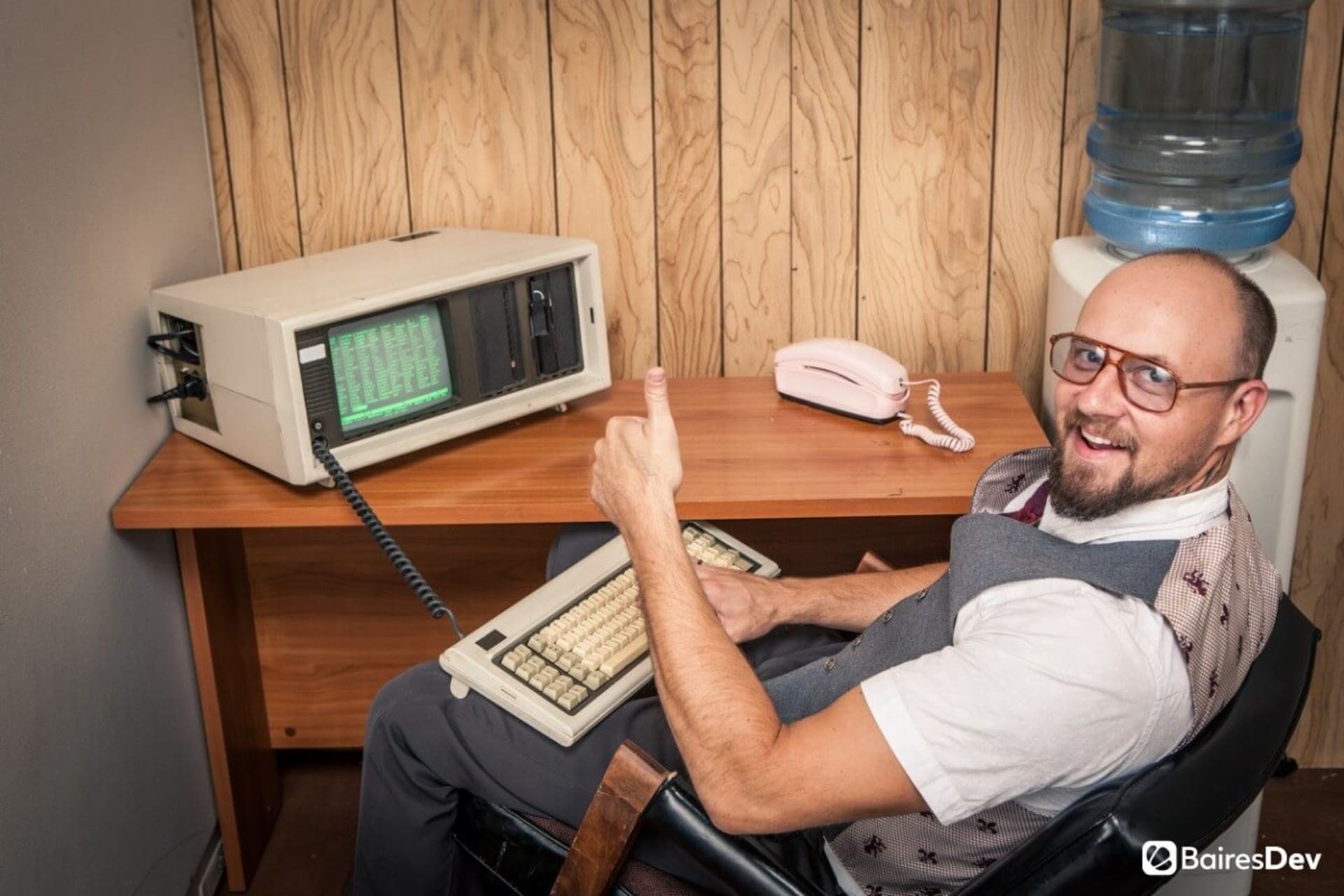Legacy Application Migration
Our Legacy App Migration development services already power dozens of active engagements. We typically land our teams within 2 weeks, so you can start shipping top quality software, fast.
500+ companies rely on our top 1% tech talent.
Legacy Application Migration Development Services We Provide
Legacy Application Assessment & Analysis
A legacy application assessment and analysis can uncover hidden opportunities for modernization.
Using CAST Highlight, SonarQube, and other tools, we delve deep into your codebase, identifying inefficiencies and areas for improvement. Our comprehensive analysis provides valuable insights for strategic decision-making and business growth.
Data Migration & Integration Services
Experience smooth and secure data migration. Utilizing tools like Qlik and Informatica, we transfer your data from legacy systems to modern environments while ensuring integrity and compliance. Our integration expertise with SnapLogic and other tools ensures that your data seamlessly integrates with new systems.
Application Rehosting
Modernize your applications with our rehosting solutions. Using AWS Server Migration Service and Azure Migrate, we move your applications to new infrastructure with minimal downtime and disruption.
Application Refactoring
Revitalize your legacy apps. With SonarQube and ReSharper, we identify and eliminate code smells and security vulnerabilities, improving maintainability and performance. Modernize your codebase, adopt best practices, and optimize algorithms for maximum efficiency and reliability.
Code Optimization & Modernization
Unlock the full potential of your applications. Using tools like Visual Studio IDE and JetBrains IntelliJ IDEA, we refactor your codebase so you experience improved performance, enhanced security, and reduced technical debt.
Integration with Modern APIs & Services
Extend your platform's capabilities. We connect your legacy applications with modern APIs and services. With MuleSoft Anypoint Platform and IBM API Connect, we enable seamless communication between your systems, unlocking new capabilities and opportunities for innovation.
Legacy Code Cleanup & Documentation
Streamline your development process. Using Understand by SciTools and Doxygen, we identify and remove obsolete code. This improves maintainability and reduces technical debt. We document your codebase comprehensively, facilitating knowledge transfer and ensuring compliance with industry standards.
Application Replatforming
Smoothly transition to modern platforms. We leverage tools including Red Hat OpenShift and Kubernetes to move your applications to a new infrastructure. Experience increased agility, scalability, and efficiency.
Legacy Systems Decommissioning & Data Archiving
Simplify your IT infrastructure. We retire obsolete applications using Veritas Enterprise Vault and Commvault and securely store historical data for compliance and reference purposes. We help you reduce maintenance costs, mitigate security risks, and streamline your operations.
DevOps & Automation Integration
Enhance collaboration between development and operations teams, accelerate deployment cycles, and boost overall efficiency. With tools like Jenkins and Ansible tools, we automate build, test, and deployment processes.
Rolls Royce case study

Key Things to Know About Legacy App Migration
Best Practices for Migrating Legacy Application Systems
Navigating the complexities of migrating a legacy system demands a strategic approach. Here are some best practices for legacy system migration.
We identify potential challenges and optimization opportunities to ensure a smooth migration process and minimize risks.
We collaborate with your team to define migration objectives that align with your business goals. We establish Key Performance Indicators (KPIs) for measurable success throughout the process.
Our experts craft a detailed migration plan, outlining timelines, resource allocation, risk management strategies, and contingency plans.
We prioritize applications based on revenue impact and technical complexity. That way, we can efficiently allocate resources and ensure critical operations remain uninterrupted during the migration.
We help you select the optimal migration strategy for your needs, whether it's rehosting, refactoring, rearchitecting, rebuilding, or replacing legacy systems.
We prioritize data integrity and compatibility throughout migration. By employing rigorous protocols and tools, we ensure smooth data transfer and compatibility with your existing systems.
We integrate thorough testing protocols to identify and address any potential issues. We maintain the reliability, performance, and functionality of your migrated applications before deployment. Our goal is to minimize risks and ensure a successful transition.
We leverage automation tools like AWS Server Migration Service and Google Cloud Migrate to streamline migration tasks. We accelerate the process while reducing manual errors and costs, thereby ensuring efficiency and accuracy.
We implement robust data security measures and privacy protocols throughout the migration process. We ensure that sensitive information remains protected against unauthorized access or breaches, safeguarding your business's reputation and integrity.
We ensure compliance with relevant regulatory standards such as the GDPR, HIPAA, and PCI DSS to mitigate risks and avoid potential penalties.
Utilizing advanced encryption protocols and secure transfer methods, we ensure the safe transfer of applications and data between environments. We will minimize the risk of data interception or tampering during migration, protecting your valuable assets and maintaining data integrity.
We track system performance metrics and gather user feedback. We can proactively identify areas for improvement and ensure optimal performance, enhancing user satisfaction and maximizing ROI post-migration.
We optimize migrated applications for efficiency and scalability, fine-tuning configurations and infrastructure to accommodate evolving business needs and increased demand. We ensure seamless operation and adaptability in dynamic environments.
Keep your migrated applications aligned with evolving business needs and technological advancements. Your system will remain secure, reliable, and fully optimized to support your long-term growth and success.
Why Choose BairesDev for Legacy System Migration Development

Robust Security Measures
We prioritize the security of your data and systems. Leveraging encryption protocols, regular security audits, and strict access controls, we ensure your sensitive information remains protected throughout the migration process.
Top 1% of Tech Talent
We hire only top-tier talent. With our developers' expertise and innovative thinking, we ensure a seamless and successful transition from legacy systems to modernized environments.
Diverse Range of Solutions
We understand that every organization has unique needs and challenges when it comes to legacy migration. We offer diverse solutions that can be tailored to your specific requirements. Whether you need application rehosting, refactoring, or complete code modernization, we will deliver the best-fit solution for your legacy migration needs.
Our process. Simple, seamless, streamlined.
During our first discussion, we'll delve into your business goals, budget, and timeline. This stage helps us gauge whether you’ll need a dedicated software development team or one of our other engagement models (staff augmentation or end-to-end software outsourcing).
We’ll formulate a detailed strategy that outlines our approach to backend development, aligned with your specific needs and chosen engagement model. Get a team of top 1% specialists working for you.
With the strategy in place and the team assembled, we'll commence work. As we navigate through the development phase, we commit to regularly updating you on the progress, keeping a close eye on vital metrics to ensure transparency and alignment with your goals.
Frequently Asked Questions (FAQ)
How does migrating a legacy system improve business opertions?
Legacy system migration can transform business operations by streamlining processes, improving scalability, and enabling you to leverage advanced data analytics. Transitioning from legacy software allows you to enhance efficiency and productivity and stay compliant with security standards and industry regulatory requirements. Moving to the cloud and updating operating systems as part of the migration helps future-proof your business and enables you to stay competitive and adaptable in a constantly changing environment.
How Businesses Can Overcome the Software Development Shortage
BairesDev Ranked as one of the Fastest-Growing Companies in the US by Inc. 5000

See how we can help.Schedule a Call










